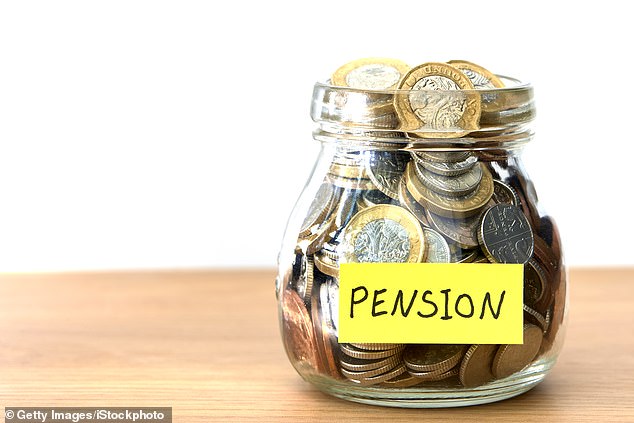British pensioners are worse off than their peers in Germany, Australia and Ireland as their finances deteriorate, a report released today reveals.
The UK is ranked 14th for retirement conditions out of 44 developed countries around the world in a comprehensive annual Global Retirement Index.
The fact that it has not achieved a higher position is due to the increasing financial pressures facing Britons, which are making it increasingly difficult to save for a comfortable retirement.
Experts are warning of a looming pensions crisis in the UK, with increasing numbers of people facing poverty in retirement due to insufficient personal savings and government support.
Shortfall: Even after April’s rise, the state pension will still be almost £3,000 short of what is needed for even a minimum standard of living in retirement.
The study, conducted by French fund group Natixis Investment Managers and seen by Money Mail, compared the lifestyles of retirees around the world by looking at four factors: health, material well-being, quality of life and finances in retirement.
The UK was ranked 18th for health and 11th for quality of life for the second year running.
But, worryingly, the retirement finance ranking fell three places this year, from 15th to 18th.
At just 66 percent, the UK was outpaced by countries including Chile (70 percent), Singapore (72 percent), Korea (71 percent) and Estonia (69 percent).
According to the latest figures published yesterday, the UK state pension will increase by £460 in April for retirees receiving a full state pension, taking their total annual income to £11,962.
Annual increases in state pensions are determined by the triple lock, which ensures that retirement incomes rise by the greater of inflation, wage growth or 2.5 per cent.
Average wages, including bonuses, rose 4 percent between May and July year-on-year, and this figure is likely to be used to establish the triple lock as it will outpace both inflation and the 2.5 percent rate.
But around eight million pensioners will not receive the full £460 increase because they are either on the old state pension or do not qualify for the full annual income.
And for many, the increases they will receive in April will not make up for the loss of winter fuel payments this year.
The government has also indicated there could be further tax rises or benefit cuts in its first budget due on October 30.
Even after April’s increase, the state pension will still be almost £3,000 short of what is needed for a minimum standard of living in retirement, according to industry-approved standards.

Crisis: Most UK savers are not saving enough, which is predicted to lead to a terrifying collective retirement savings shortfall of £25 trillion by 2050
UK state pensions will also remain among the least generous among developed countries. Pensioners in Spain, Belgium, Cyprus and France receive more generous incomes compared to the cost of living in those countries, according to a recent analysis by the advisory firm Almond Financial.
Maintaining your standard of living in retirement is hard enough, but saving for retirement is also an increasing struggle in the UK, due to inflation pressures, slow wage growth and rising unemployment, Natixis analysis reveals.
The report warns that retirees are increasingly having to rely on their own retirement savings to support themselves. For most, this means saving money in a private or workplace pension fund, as the state pension will not be enough to support them in old age.
However, most UK savers are not saving enough, which Natixis projects will lead to a terrifying collective retirement savings shortfall of $33tn (£25tn) by 2050. This will mark a massive widening of the savings gap, which totalled $8tn (£6tn) in 2015, it warns.
Andrew Benton, Head of Northern Europe, Middle East and Africa at Natixis, said: ‘There have been major changes in recent years that impact our finances and our plans for the future.
‘While retirement security has improved in the UK, people are increasingly taking their own security into their own hands given the changing market environment.
‘In light of this, financial service providers need to be more proactive in helping people save more, up to and during retirement.’
A couple now needs up to £59,000 a year for a “comfortable” retirement, or £43,100 for a “moderate” one, latest figures from industry body the Pensions and Lifetime Savings Association (PLSA) suggest.

Ranking: The UK is ranked 14th in retirement conditions out of 44 developed countries around the world, in a comprehensive annual Global Retirement Index
These sums have risen substantially from £54,500 to £34,000 in a single year thanks to rising inflation last year, which was identified by Natixis as one of the main obstacles facing Britons seeking a decent lifestyle in retirement.
Achieving that level of income is beyond the reach of all but the wealthiest retirees. In fact, only 16 per cent of Britons still working expect to be able to lead a comfortable lifestyle in retirement, according to PLSA standards.
Younger workers are more optimistic: 30 percent of those aged 18 to 34 expect a “comfortable” or “more than comfortable” lifestyle, according to a study by retirement consultancy My Pension Expert yesterday. Only 13 percent of those aged over 55 expect this outcome.
But almost half of 18- to 25-year-olds are still not saving in a workplace or private pension fund, according to government figures.
The funded support network could cost them hundreds of thousands of pounds in retirement, the Money and Pensions Service reveals.
Lily Megson, policy director at My Pension Expert, said: ‘The fact that millions of UK adults work for decades but do not enjoy a comfortable retirement at the end highlights that there is a pension planning crisis in this country.
‘Not knowing how much is being saved in pension funds, where those funds are and how to best manage that money are all serious problems, and it is clear that both the Government and the financial services industry need to do much, much more.’
Switzerland takes the overall crown for best place to retire according to Natixis, with an overall score of 82 percent, displacing Norway from the top spot, which it held for the previous two years.
Iceland and Ireland ranked third and fourth respectively, followed by the Netherlands, Luxembourg, Australia, Germany, Denmark and New Zealand.
Countries in the top ten tend to perform well in all four categories. However, Switzerland was the only one to rank in the top ten in all four.
Ireland ranked first in the retirement finance category, based on performance across indicators such as inflation, interest rates, tax burden, public debt and governance. Second places went to Switzerland, Australia, Singapore and South Korea.
rachel.rickard@dailymail.co.uk
Some links in this article may be affiliate links. If you click on them we may earn a small commission. This helps us fund This Is Money and keep it free to use. We do not write articles to promote products. We do not allow any commercial relationships to affect our editorial independence.


